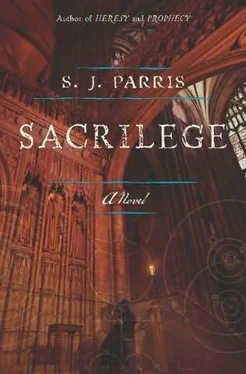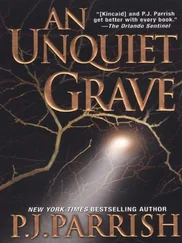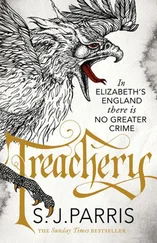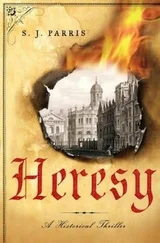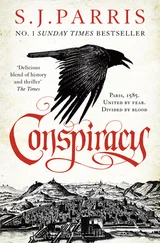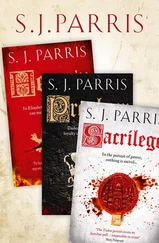There was no sign of anyone along the path that led around the north side of the cathedral—I guessed every canon was required to attend the meeting in the Chapter House—and I was able to approach the rear of the treasurer’s house unobserved. The casement at the back still hung open on its hinges and again I squeezed myself uncomfortably through. This time it took only a matter of minutes to insert the blade of my knife into the lock of the door behind the tapestry in Langworth’s chamber and turn the lock; to my great relief I could make out through the gloom the shape of the packet Langworth had tossed inside the room in his haste to answer the door to the dean earlier, meaning he had not been back since and therefore would not have discovered my theft. I left the door to the chamber open so that a thin light filtered through into the back room. As quickly and quietly as I could, I lifted the loose hearth tile, replaced the keys and the original letter from Mendoza in the engraved casket, and carefully turned its clasp again. My heart was pounding as I fitted the tile back into place, but I was flushed with a sense of triumph. Langworth would never know anyone had found his secret hiding place, even as my transcript of his letter was making its way to London. The canon treasurer was already on his guard against me, but my one advantage over him was that he didn’t know that I was aware of this. For as long as he felt it was in his interest to keep playing along with me, thinking he was the one with the upper hand, I could hope to gain more time. But what had he meant when he said to Samuel that he had an idea of how to keep me out of trouble, if need be? I froze, glancing at the door, my skin prickled with gooseflesh despite the heat, but there was no sound except my own breathing. Whatever Langworth had in mind for me, I would need to keep my eyes at my back at all times.
The brown paper packet he had thrown inside the room when he was interrupted lay where it had fallen. I knelt and gingerly picked it up at the corners between the tips of my fingers so as not to leave any tell-tale marks on the wrapping. Almost as soon as he heard news of Fitch’s death, it seemed, he had hastened to the apothecary’s shop in search of something. What could be so important that he feared it might be found?
I untwisted the paper and laid it open on the boards. Inside were two black pills, about the size of a gold angel coin and the thickness of my little finger. I lifted one; it was solid enough not to crumble between my fingers, and as I bent to sniff it I caught an odour that was familiar but I could not quite place. I closed my eyes and tried to push from my mind every pressing thought and anxiety, focusing only on allowing my memory to dredge the silt of years in search of the source of that recognition. I sniffed the black lozenge again and there flashed into my mind an image of the infirmary at San Domenico Maggiore, a workbench strewn with chopped herbs, the brother infirmarian with his hooked nose hunched over a glass jar containing some substance with this faint, musky scent…
“Laudanum.” I whispered it aloud as the memory clicked into place, my voice immediately swallowed by the muffled silence. Laudanum—a remedy so powerful it was once considered to have magical properties, derived from the tears of the wild poppy. It was costly, certainly, but was that why Langworth had rushed to rescue it from the destruction of Fitch’s shop? There were doubtless other valuable substances there too, but he had gone specifically to bring back these two pills and hide them. I exhaled slowly, closed my eyes again, letting my memory feel its way.
I had learned a little of the uses of laudanum during my apprenticeship in the infirmary as a novice. The infirmarian had used it sparingly, because of the expense, but its effects were remarkable; given in a tincture with strong wine, it could temporarily dull pain and induce an intense sleep in which the patient appeared as good as dead. I recalled when one of the monks had fallen from a ladder while repairing a window in the monastery’s great church and shattered his leg; the infirmarian had tried to set it, but infection had taken hold and to save the poor brother’s life, it had been necessary to saw the leg off above the knee—an operation carried out with the man deep in the sleep of laudanum. As the infirmarian’s assistant, I had been the one to hold the man steady on the table as his leg was removed; I recalled watching in disbelief as the blade bit deep into his flesh while he barely twitched in his sleep. Dangerous stuff, the infirmarian had told me brusquely, seeing my amazement. Brings as much pain as it takes away. The Portuguese traders to the east smoked it, for a deceptively brief pleasure, but it drove them mad with demonic dreams. The Arabs had used it in medicine for centuries, he had explained, and because of that the Church had banned its use, believing that any substance beloved of the infidels must be the work of the Devil. So the Inquisition had ensured that for the best part of two centuries laudanum had fallen out of use in Europe, and it was only at the beginning of our own century that physicians had rediscovered its properties, thanks to the writings of—
“ Paracelsus! ” I smiled to myself in the half-light, turning the fat pill over between my fingers. Of course—Paracelsus had brought it back from his travels in Arabia in just this form, supposedly hidden in the pommel of his sword. “Stones of Immortality,” he called them, these black tablets made from laudanum, mixed with citrus juice and quintessence of gold.
I thought of the burned scrap of paper I had taken from Fitch’s hearth. Paracelsus again. The apothecary’s papers had been burned to conceal a reference to Paracelsus, and now here was Langworth spiriting away laudanum pills which also spoke, at least obliquely, of the alchemist’s work. What was the connection?
I wrapped the black pills back in their brown paper and sat for a moment in the shadows, thinking of Paracelsus. I had felt an affinity with the maverick Swiss alchemist since I first encountered his proscribed books as a young monk. I had admired the way he refused to content himself with the ideas of the past and had set out to overturn the lazy, narrow thinking of the academies, whose learning derived from tradition, not experiment. In the process he had acquired a reputation as a troublemaker and frequently found himself hounded out of the universities, accused of necromancy by those made fearful or jealous by his hunger for knowledge and his rebellious independence. Without consciously intending to follow in his footsteps, I had found myself repeating his experience half a century later, driven by (I liked to think) the same tenacious spirit of enquiry into the nature of this vast universe we inhabit.
Like me, Paracelsus had been fascinated by the secret wisdom and natural magic of Hermes Trismegistus, the Egyptian sage who was called the father of alchemy and natural magic. It was a lost manuscript of Hermes that I had followed from Italy to France to England and finally held in my hands for a moment last autumn, before Henry Howard had snatched it away. A book believed to contain the secret of man’s divinity—a secret more powerful even than the philosopher’s stone, which Paracelsus was supposed to have received from an Arabian adept in Constantinople. This was the book I dared to hope Howard might have entrusted to Langworth, via his nephew, to keep it from the eyes of the government searchers he knew would ransack his own houses for evidence of treason. And now here was Langworth hiding stones of laudanum, and William Fitch—or his murderer—burning recipes that spoke explicitly of Paracelsus. I pushed my hands through my hair, gripping clumps between my fingers, as if to press my brain into making the connections, but the sense of it all eluded me, swirling through my muddied thoughts.
Читать дальше
Конец ознакомительного отрывка
Купить книгу
